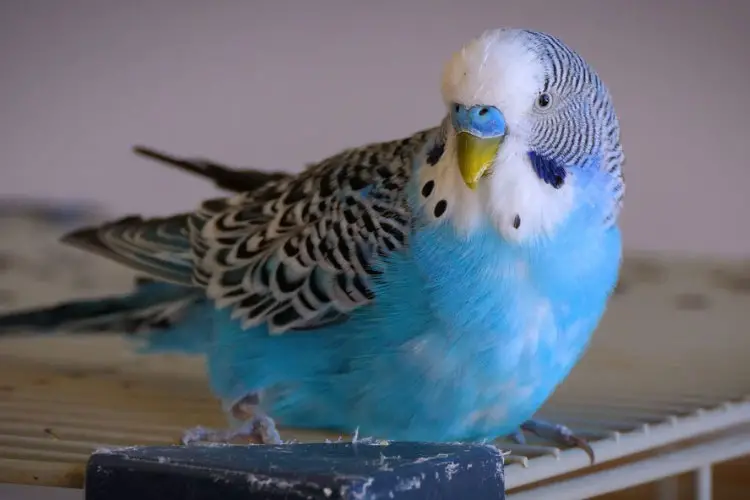Budgies can easily become lonely especially when they’re all alone in the cage and they don’t get much attention from you. But before you jump to conclusion that your budgie is lonely, you need to look for certain tell-tale signs of loneliness in your pet bird.
Signs of a lonely budgie include your budgie plucking its feathers, loss of appetite, no more singing or chirping, hiding, and wanting to be alone. A lonely budgie may also self-mutilate, where it chews its skin and injures itself, exposing its body to harmful bacteria.
The following guide explains more about how a lonely budgie behaves. Plus, you’ll discover other helpful info such as how to make your lonely budgie happy, whether a budgie can die due to loneliness, and more!
5 Signs of a lonely budgie
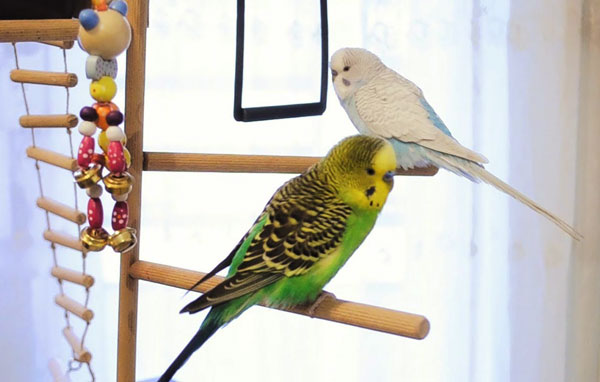
Here are the 5 key signs that tell if your budgie is unhappy and lonely:
1. A lonely budgie plucks its feathers
One of the key signs of a lonely budgie is plucking its feathers. The parakeet tends to turn destructive due to the frustration of being alone. It may also start shredding its toys and cage liners.
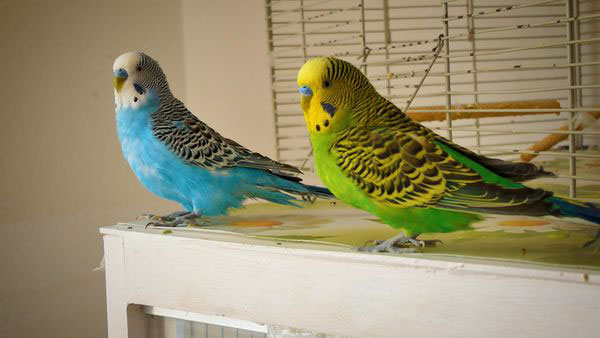
The stress it feels from being alone makes it damage its feathers as a way of self-soothing. But repeatedly doing this causes damage to its feather.
However, feather-plucking behavior in pet parrots could also be due to lack of proper nutrition, boredom, or expression of sexual frustration.
2. Self-mutilation
Besides plucking feathers, your lonely budgie may also turn destructive to the point of doing self-mutilation. It does this by chewing its skin which can expose its body to harmful bacteria.
In the worst case scenario, your budgie may dig deeper into its bones and muscles and self-inflict serious injuries that may end up costing its life.
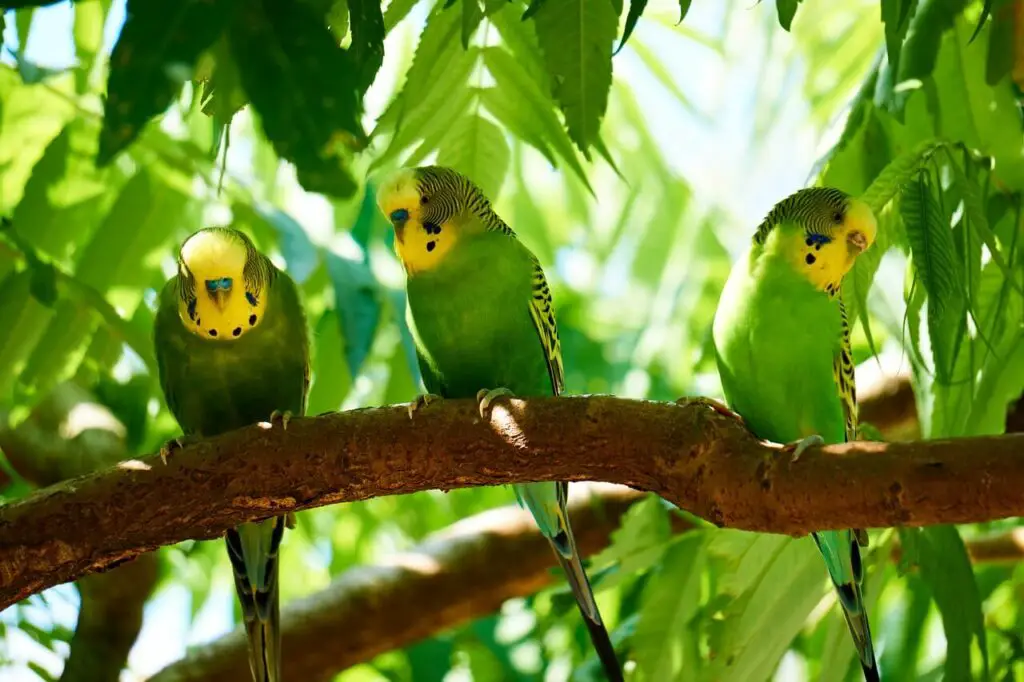
If this happens, you should take your pet to an avian vet asap for treatment. The vet will likely fit your pet bird with recovery cones to stop it from causing more harm to itself.
3. Loss of appetite
Just like we humans may stop eating when they get lonely, budgies too lose appetite as a sign of loneliness.
If you notice that your budgie starts eating less food than before or just doesn’t eat, then it is probably lonely.
Budgies generally eat throughout the day due to their extremely high metabolism and won’t survive for more than 48 hours without food or water.
So, you should take your bird to the vet for a checkup to see the reason behind its failure to eat.
4. Your budgie doesn’t sing anymore
When your budgie is happy and healthy, it’s always in the mood to swing, talk, and even play with you. But in case your budgie suddenly stops singing or chirping and no longer wants to engage, that’s a surefire sign it’s unhappy.
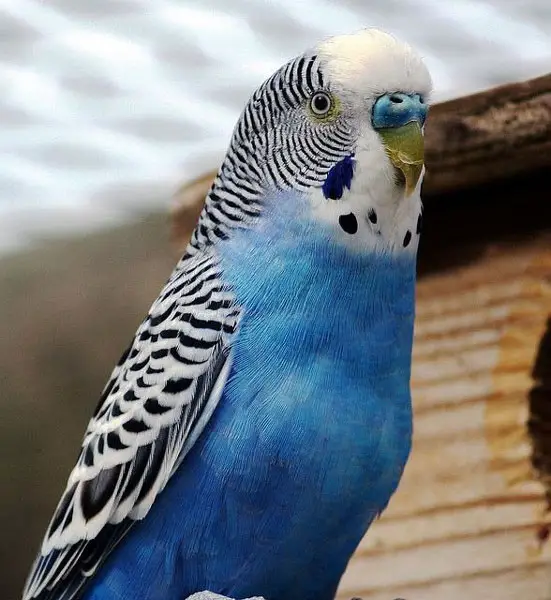
5. Isolation
You can also tell if your budgie is lonely if it starts isolating itself or hiding in its cage. This especially happens when the budgie is grieving the death of loved ones. It may withdraw from the rest if it struggles with the loss.
Note that if you’ve got a newly adopted budgie, it could be hiding due to fear. Thus, you shouldn’t be too quick to judge a budgie you recently brought home as being lonely.
What makes your budgie lonely?
Budgies can become lonely due to various things, but it all boils down to lack of bond with their flock members as well as lack of companionship and care from their owners.
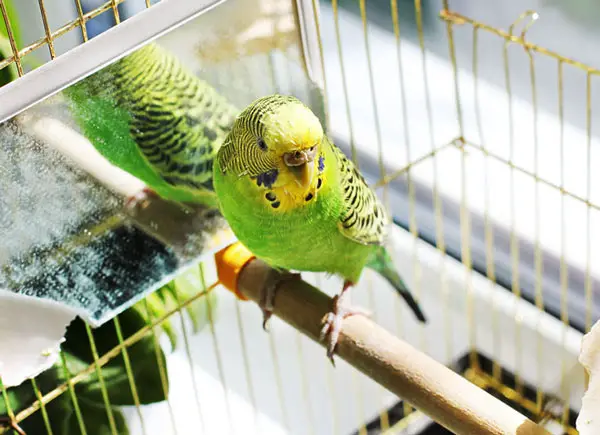
Let’s briefly discuss the main reasons why your budgie may be lonely:
- Death of a fellow budgie: Budgies are social creatures and tend to form strong bonds and attachments with fellow budgies in the same cage. Thus, if a cage mate dies, then the surviving one will most likely fall into sadness, loneliness, and even depression.
- Losing a favorite toy: Did you know that your budgie can become attached to its favorite toy? Well, if you recently removed a toy it loved to play with, then you may have unknowingly forced it into loneliness.
- Shifting of their cage position: As a creature of habit, shifting your bird’s cage position after it’s been used to its environment for a long period can cause it to become sad.
- Lack of attention: If you don’t give your budgie proper care and attention, it may also start feeling stressed and lonely. be sure to set apart time every day to interact with your pet bird.
Sometimes, human companionship only won’t be enough for your pet bird, or it may not get along well with a fellow budgie, which can also cause loneliness.
Can a budgie die from loneliness?
Your budgie can die from loneliness. Take an instance where your budgie inflicts injuries on itself or stops eating.
Lack of appetite makes your budgie lose weight and become malnourished due to a lack of key nutrients. This weakens its health and immune, increasing the death risk.
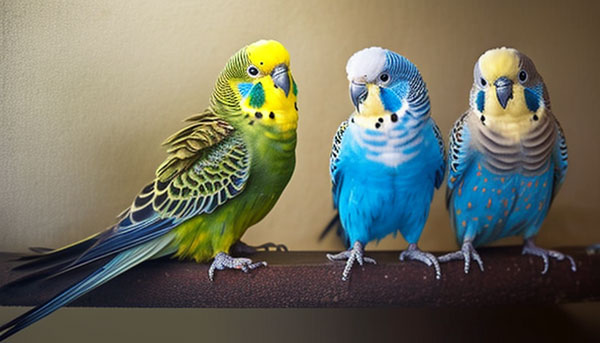
Remember that a budgie can’t go without food for more than 24 hours and will start experiencing adverse effects by 48 hours and easily perish!
Self-inflicted injuries can also cause the death of your budgie.
How do you keep a lonely budgie happy?
You can help a lonely budgie by giving it attention. Set aside several hours every day to interact with your pet bird and keep it happy.
If your budgie just lost a loved one or a toy, you should give it even more attention.
Also, you should get your budgie a compatible cage mate in case they lost a partner. Get a companion of the same species as your budgie to ensure they get along well.
Consider getting your budgie some new different toys to play with. These will help distract it from feeling sad or lonely.
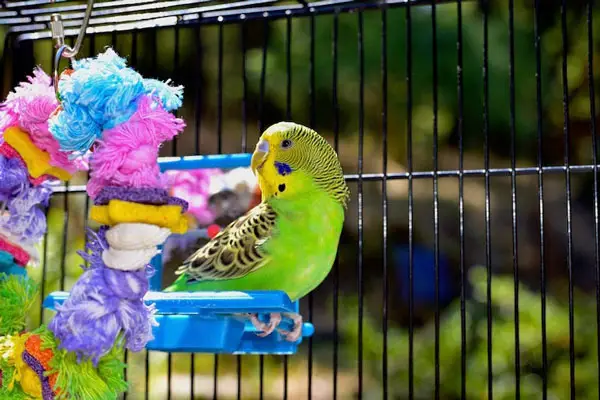
Taking your budgie out and teaching it new tricks will also keep it happy compared to having it sit inside the cage all day.
Get your budgie a bigger cage so it can freely fly inside and not get bored and lonely in a small cage.
Above all, set a fixed routine for feeding, bathing, and playing with your budgie. This is a trick to keep him/her eager and excited as he/she waits for these activities every day.
Should I get my budgie a friend?
Absolutely! Your budgie requires a lot of socialization and it will be happier if you get it a companion.
Even in the wild, the budgies are highly social and are always seen in flocks of dozens.
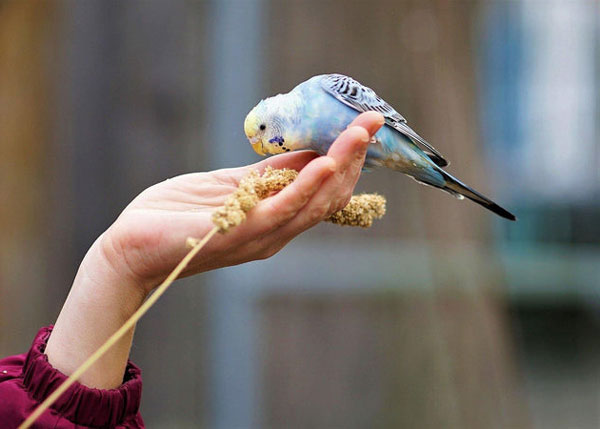
The need for a companion becomes even more if you work all day and have less time to interact with your pet bird.
However, make sure you select a budgie that has a similar personality to your current budgie so they can easily get together.
Do budgies get lonely when one dies?
Budgies do grieve the loss of their fellow pet birds. When you house two budgies in the same cage and they get along well, they’ll create a strong bond, being the social creatures they’re.
In the unfortunate incident that one budgie dies, the surviving one will be struck by grief and sadness, loneliness, and depression shall quickly follow.
The budgie may show some melancholy symptoms as it mourns the loss of its partner. For instance, it may start searching the cage for its lost partners or even call it out.
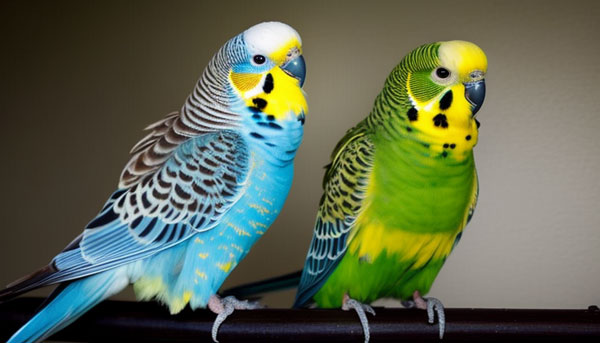
Believe it or not, a budgie can memorize its partner’s vocalizations during courtship, so it may try mimicking its partner’s voice to see if it will come out.
The mourning period for budgies can go for 1-2 weeks, though it can go longer at times.
FAQs:
A single budgie can be happy, but it will be even happier when it’s in the company of a partner. While interacting with your budgie daily will keep it happy, you can’t ignore the fact that this is a social bird and requires a companion to live a happy life.
Some tips for cheering up a depressed budgie include getting it an assortment of toys to play with, getting it a bigger cage, taking it out to exercise, getting it a new companion, and spending several hours every day interacting with it.
You should set apart at least an hour of your full interaction to interact and play with your budgie. The longer the hours, the better it will be for your budgie. You can spend the hour at once or do it in short sessions, whichever suits you.
Final Verdict
Knowing how to read the signs when your pet budgie falls into loneliness will help you take action on time and help lighten it up. The key signs to look out for in your little friend include loss of appetite, plucking feathers, lack of usual chirping in your budgie, isolation, and self-mutilation. Shredding the toys and cage liners are other ways your beige can express the frustration of being alone.
When you notice a couple of these signs, then you know for sure your budgie is lonely and needs help. Some tips for taking care of your lonely budgie include getting it a companion if it has lost one, getting it toys to play with, and creating more time to play with it. Follow the tips discussed in the above guide on how to cheer up your lonely budgie and it will stay happy at all times!
